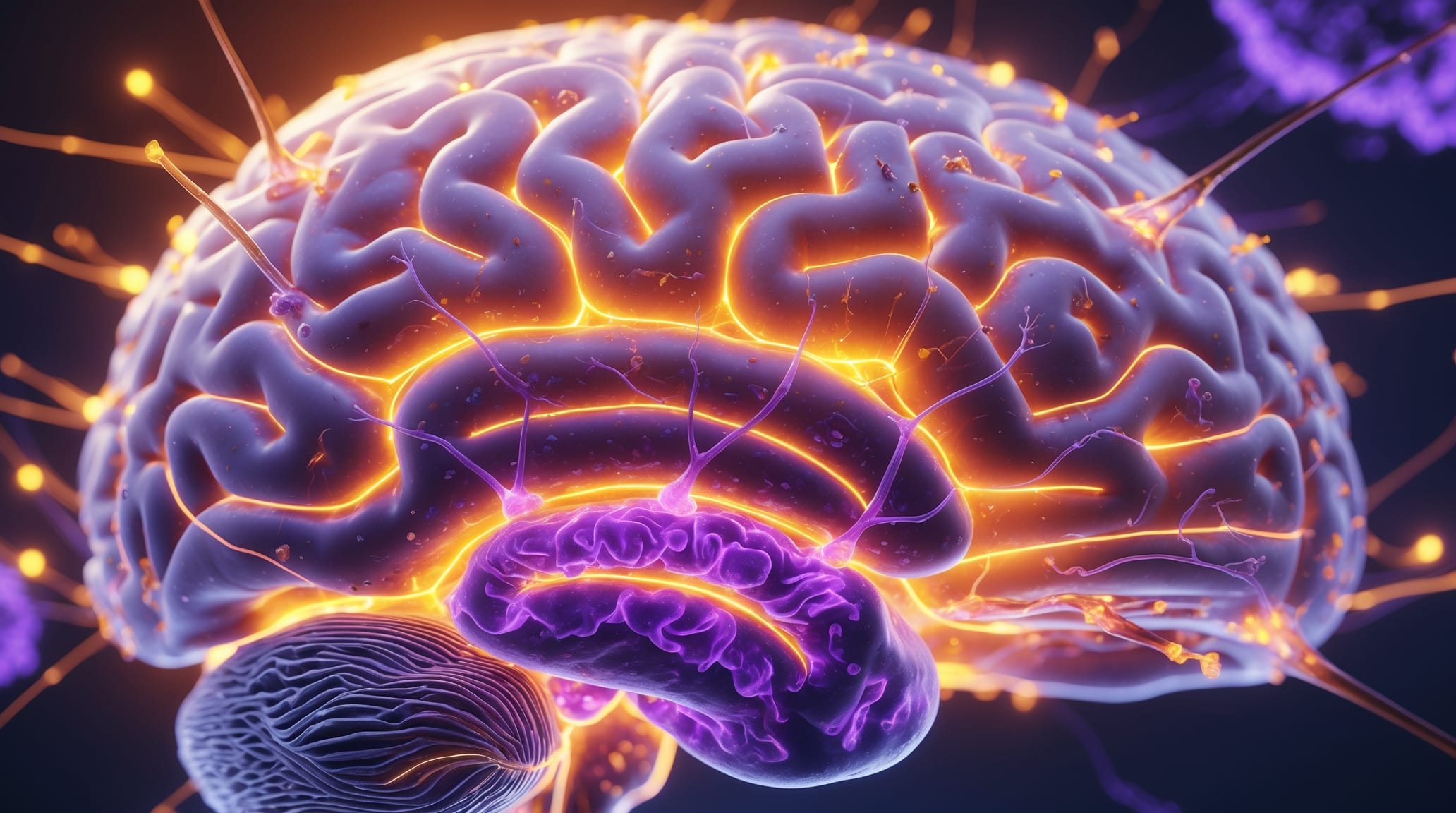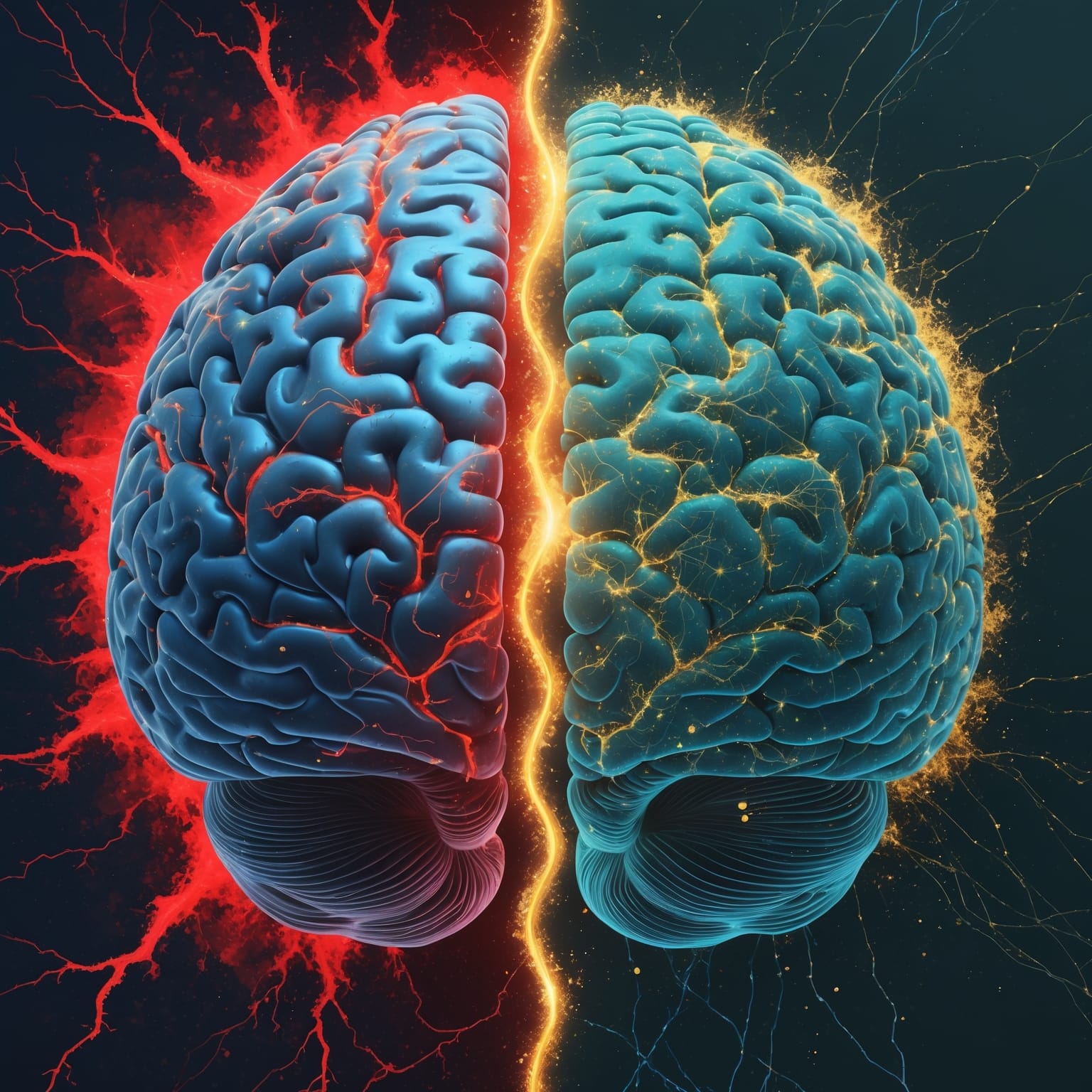
The Hidden Neuroinflammation Cycle Keeping Menopausal Women Awake (And How to Break It)
Why your shame spirals, sleepless nights, and anxiety attacks are connected by invisible brain inflammation and what Harvard research reveals about reversing the cycle
Pharmacologist, Consciousness Architect, and Mother who spent 17 years understanding brain patterns through caregiving
If you're lying awake at 3 AM with shame spiraling through your mind while anxiety grips your chest, you're not experiencing three separate problems. You're caught in what I call the neuroinflammation menopause cycle: a scientifically documented pattern where your brain's immune system has turned against your emotional well-being.
After seventeen years of caring for my autistic son Omar, I learned to read subtle patterns in brain function that most people miss. What started as a mother's intuition became rigorous scientific investigation during my pharmacology studies at King's College London under Professors John F Tucker and Alan Gibson. The breakthrough came when I realized that the shame keeping you awake, the sleep loss amplifying your anxiety, and the anxiety triggering more shame weren't separate issues — they were symptoms of the same inflammatory process rewiring your menopausal brain.

Neuroinflammation menopause creates measurable changes in brain microglia activation, connecting shame spirals, sleep disruption, and anxiety in a self-perpetuating cycle that affects millions of midlife women.

Why Your Brain Feels Like It's Fighting Against You
You know that feeling when shame hits and suddenly your entire nervous system goes haywire? There's actual science behind that cascade, and it starts with cells called microglia that I spent months studying in London's neuroscience labs.
When you experience shame — whether it's from feeling like you're failing at work, struggling with body changes, or comparing yourself to other women — your brain's microglia detect this as a threat. Unlike the immune cells in your body that fight infections, microglia are your brain's specialized immune system, and they respond to emotional pain the same way they respond to physical injury.
Here's where it gets personal: during my years with Omar, I noticed that my worst shame spirals always happened on nights when my sleep was already disrupted. What I didn't understand then was that my brain's inflammatory response was creating a feedback loop. The shame activated my microglia, the inflammation disrupted my sleep architecture, and the sleep loss made my brain more reactive to shame the next day.
The Inflammatory Cascade You Can't See
When your microglia shift into crisis mode, they release a cocktail of inflammatory molecules that directly interfere with the brain systems you need most:
Interleukin-1β (IL-1β) disrupts your sleep's deep restoration phases and makes your amygdala hypersensitive to threats. Tumor Necrosis Factor-α (TNF-α) interferes with serotonin production, making emotional regulation feel impossible. Interleukin-6 (IL-6) triggers your stress response system, keeping cortisol elevated even when you should be winding down for sleep.

The neuroinflammation menopause cycle involves specific inflammatory molecules that interfere with brain systems controlling sleep, emotions, and stress, creating measurable changes at the cellular level.

The Menopause Amplification Effect
If you're wondering why these patterns feel more intense now than they did in your thirties, the answer lies in what happens when estrogen withdrawal meets existing inflammatory patterns. Your brain has been depending on estrogen's anti-inflammatory protection for decades, and now that shield is dissolving.
During Omar's most challenging periods, I was also navigating perimenopause, though I didn't connect the dots initially. The shame I felt about not being the perfect mother hit harder. My sleep became more fragmented. My anxiety felt sharper, more urgent. What I later learned through studying neuroinflammation menopause research was that my changing hormone levels weren't just causing symptoms — they were amplifying an inflammatory cycle that had been building for years.
Why Your Shame Feels Heavier Now
You might have noticed that criticism that would have rolled off your back at 35 now feels devastating at 50. This isn't psychological weakness — it's neurobiological reality. Your brain's anterior cingulate cortex, which processes emotional pain, becomes hyperactivated when estrogen protection diminishes.
MIT's McGovern Institute research reveals that this creates what they term "emotional allostatic load" — where your brain's capacity to bounce back from emotional stress becomes compromised. The shame spirals that once lasted hours now persist for days because your neuroinflammatory system lacks the resilience it once had.

The Mother Wound Connection: When Inflammation Has Roots
If you grew up feeling like you had to be perfect to earn love, your brain's shame circuits were carved deep early in life. The University of California San Francisco's landmark study on adverse childhood experiences shows that emotional invalidation literally alters gene expression in ways that make your microglia more reactive decades later.
This hit close to home for me. Caring for Omar while managing my own mother wound meant I was constantly triggered by feelings of inadequacy. Every behavior plan that didn't work, every social situation that went badly, every moment I felt like I wasn't enough activated shame patterns that went back to my own childhood experience of never being quite right.
What the research reveals is profound: your brain remembers shame at the cellular level through what scientists call "inflammatory memory." If you experienced early emotional neglect or criticism, your microglia developed a hair-trigger sensitivity that makes the neuroinflammation menopause cycle more likely to activate during midlife transitions.

The Sleep Disruption Engine
You probably know that stress affects sleep, but you might not realize that neuroinflammation menopause creates a specific type of sleep disruption that's different from typical insomnia. When inflammatory cytokines flood your brain, they don't just make it harder to fall asleep — they fundamentally alter your sleep architecture.
Northwestern University's sleep research lab documented that inflammatory sleep disruption specifically targets your deep sleep phases — the restorative periods when your brain clears metabolic waste and consolidates emotional memories. When these phases are compromised, your brain can't process the day's emotional content properly, leaving you more vulnerable to shame spirals the next day.
The 3 AM Wake-Up Pattern
If you consistently wake up between 2-4 AM with racing thoughts, you're experiencing what researchers call "inflammatory sleep fragmentation." Your elevated cytokine levels are directly interfering with your brain's natural sleep cycles.
This pattern became my nightly reality during Omar's most challenging adolescent years. I would finally drift off around midnight, exhausted from the day's emotional labor, only to bolt awake at 3 AM with shame thoughts flooding my mind. What felt like psychological torment was actually my inflamed brain struggling to maintain normal sleep patterns.

Neuroinflammation menopause causes specific sleep disruption patterns, with inflammatory cytokines targeting deep sleep phases and creating the characteristic 2-4 AM wake-ups experienced by many midlife women.

Breaking the Cycle: Your Brain's Remarkable Capacity for Change
Here's what changed everything for me: recognizing that if neuroinflammation menopause patterns could be measured and understood, they could also be interrupted and rewired. Your brain's neuroplasticity — its ability to form new connections — doesn't disappear at menopause. In fact, research suggests that understanding these patterns gives you unprecedented power to change them.
The Anti-Inflammatory Rewrite Protocol
Effective intervention requires what I learned to call "simultaneous system reset": addressing the shame circuits, sleep architecture, and anxiety patterns as interconnected systems rather than separate problems.
Shame Circuit Rewiring: This involves activating your brain's self-compassion networks through specific practices that have been shown to reduce microglial reactivity. When you learn to recognize shame spirals as inflammatory responses rather than truth about your worth, you can interrupt the cascade before it disrupts your sleep.
Sleep Architecture Restoration: This goes beyond sleep hygiene to address the inflammatory factors disrupting your deep sleep phases. Research from Harvard's Division of Sleep Medicine shows that anti-inflammatory approaches can restore normal sleep architecture within 6-8 weeks.
Anxiety Pattern Interruption: This focuses on calming your hyperactive fear networks while supporting the production of GABA and other anti-inflammatory neurotransmitters that naturally decline during menopause.

Neuroinflammation menopause patterns are reversible through neuroplasticity, with research showing significant improvements in brain inflammation, sleep quality, and emotional regulation within 8-12 weeks of targeted intervention.

Your Personal Neuroinflammatory Pattern
The breakthrough moment in my own healing came when I stopped trying to fix individual symptoms and started mapping my unique neuroinflammatory signature. You likely have patterns too — specific shame triggers that predictably disrupt your sleep, or anxiety responses that intensify after poor rest.
With Omar, I learned that behavior patterns always had underlying logic, even when they seemed chaotic on the surface. The same principle applies to your neuroinflammation menopause cycle. Your brain isn't betraying you — it's responding to inflammatory signals in predictable ways.
Recognizing Your Unique Signature
Your neuroinflammatory pattern might show up as:
- Shame-driven insomnia where emotional pain keeps you awake
- Sleep-loss anxiety where poor rest makes everything feel overwhelming
- Anxiety-shame cycles where worry triggers self-criticism
- Physical inflammation symptoms that worsen during emotional stress
- Cognitive fog that intensifies during shame or anxiety episodes
Understanding your specific pattern is crucial because effective intervention depends on interrupting your brain's particular version of the cycle.

The Recovery Timeline: What to Expect
One question I get constantly is: "How long does it take to break the neuroinflammation menopause cycle?" Based on both research and my personal experience supporting women through this process, here's what recovery typically looks like:
Weeks 1-2: You'll likely notice improved sleep quality first as inflammatory load begins to decrease. The 3 AM wake-ups may still happen, but they'll feel less emotionally charged.
Weeks 3-6: Shame spirals start losing their grip as your brain's self-compassion networks strengthen. You'll notice thoughts that once sent you into shame loops now feel more manageable.
Weeks 6-12: Anxiety responses become more proportionate as your nervous system recalibrates. What once felt overwhelming now feels like information you can work with.

Why Traditional Approaches Keep You Stuck
If you've tried sleep medication, anxiety therapy, and shame work separately without lasting results, it's not because you're broken or not trying hard enough. It's because the neuroinflammation menopause cycle requires systems-level intervention that addresses the underlying inflammatory patterns driving all three symptoms.
Most conventional treatments work on surface symptoms while the deeper inflammatory cascade continues unchecked. It's like trying to clear smoke while the fire keeps burning.
During my years supporting Omar, I learned that addressing individual behaviors without understanding their neurological foundations led to temporary changes that didn't last. The same principle applies to the shame-sleep-anxiety triad. You need approaches that work with your brain's inflammatory patterns, not against them.

Frequently Asked Questions About Neuroinflammation Menopause
Ready to Interrupt Your Neuroinflammation Cycle?
The patterns keeping you awake at 3 AM have identifiable mechanisms and changeable pathways. Whether shame disrupts your sleep, anxiety amplifies your emotional reactivity, or sleep loss triggers more shame, targeted approaches can help you reclaim your neural sovereignty.
Discover Your Unique Neuroinflammatory Signature with our Founding Sister Bundle — integrated support for the interconnected patterns that keep midlife women stuck.
Continue Your Journey
Discover how early attachment disruptions create lasting changes in your brain's stress response systems.
Understanding how declining hormones reshape your neural networks and inflammatory responses.
Personal insights into brain adaptation, pattern recognition, and the neuroscience of resilience.
